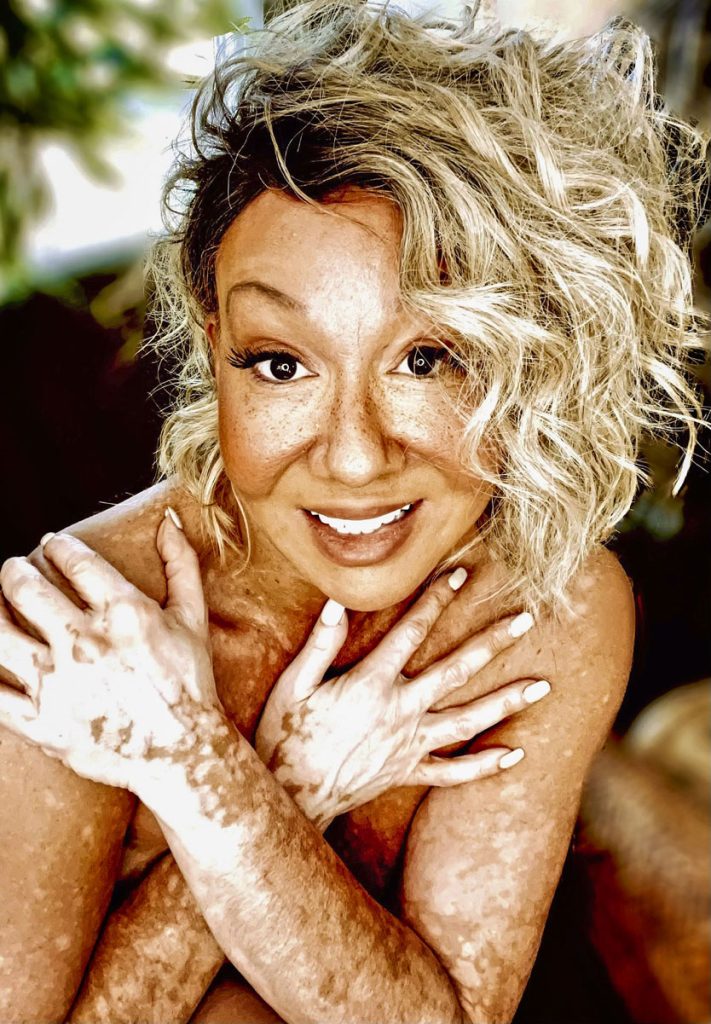Loving the skin she is in

Marco Fields is one of 70 million people in the world who are living with vitiligo, an autoimmune disease where the body’s immune system attacks the cells that determine hair and skin color. When this happens, the pigments change or disappear leaving a blotchy, white look on the skin, hair or scalp.
The Hamlet resident Marco Fields is a mother, businesswoman, volunteer, champion for women and one of 70 million people in the world who are living with vitiligo, an autoimmune disease where the body’s immune system attacks the melanocytes, the cells that determine hair and skin color. When this happens, the pigments change or disappear leaving a blotchy, white look on the skin, hair or scalp, and sometimes inside the nose or mouth.
Vitiligo targets race and sex equally, but it is more easily seen on darker skin tones and is usually a lifelong affliction. Because there is no cure and because the skin condition is noticeable, many who have vitiligo can experience social anxiety and depression.
“I was in my mid-40s when I first noticed a light spot on my left hand in the summer of 2018,” stated Fields, who is biracial. “It was a particularly stressful time and over a period of six months, the spot grew and other spots emerged on my other hand.” The spots eventually disappeared and she regained her lost pigment; but then two years later, the spots reappeared with new ones appearing on her chest and feet. Fields sought medical advice.
Vitiligo is a 16th century Latin word for “tetter,” which eventually evolved to an old English word for “skin disease.” There is no exact cause of vitiligo, but dermatologists say it can be hereditary, a secondary development to other autoimmune conditions like lupus, diabetes or celiac disease; it can be caused by environmental factors or a result of physical or emotional stress. Animals can also get vitiligo.
Vitiligo was a crushing diagnosis for Fields. Raised in a small town in Utah by a white mother and black father, she was self conscious of her skin color. She said that it took her until her 20s to “fall in love with my golden-brown skin tone.”
Vitiligo made her feel like she permanently lost a part of her identity. She lost self confidence and felt fear and shame. Fields thought people were staring and judging her, so she changed the way she dressed; she hesitated before going to social gatherings and did not want to schedule regular appointments, like getting her nails done. She was asked if she was contagious, in a fire or had leprosy. “People would say ignorant things and shy away from looking at me,” said Fields. “I felt completely worthless.”
A doctor prescribed antidepressants, but Fields felt he was treating the symptom when she was more interested in finding a cure. Her dermatologist had her applying “stinky” skin creams, taking vitamin D supplements and weight-gaining steroids, as well as enduring a cocktail of ultraviolet light therapies which she said made her feel like she always had a sunburn.
Then Fields had an epiphany. “I just said ENOUGH. I knew I had to change my mindset and stop focusing on the need to ‘keep my color’ and start loving the new me,” she said. “It was time for radical self acceptance and to begin loving the skin I was in.”
Today, Fields’ everyday strategy is to meditate, practice breathing exercises and to incorporate love in everything she does. The result is that the spread of the disease has “dramatically slowed” for her.
At the end of 2022, Fields decided to go public with her journey. On May 30, she launched a campaign on her website and on her social media accounts where she writes a daily post of her experiences, lists resources, and encourages her fellow “vitiligans” toward self love and acceptance.
Fields credits her daughter, Jada, for being her rock throughout the past few years. Today, Fields is fine with people asking about her condition, and she welcomes the honest dialogue.
“My being open and vulnerable usually relieves some of the tension and offering that grace to others opens the door for a thoughtful conversation,” concluded Fields. “I love that because I know that I have facilitated an opportunity for more kindness…and that makes my heart smile.”
World Vitiligo Day is observed on June 25, a day chosen by vitiligo communities to pay homage to pop superstar Michael Jackson, who developed the disease in the 1980s and had it until his death on June 25, 2009.
To learn more about vitiligo, visit globalvitiligofoundation.org. To follow Fields, visit marcofields.com, on Facebook under her name and on Instagram @MoxxyWoman.
By Hollen Wheeler; photo courtesy of Marco Fields